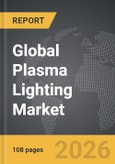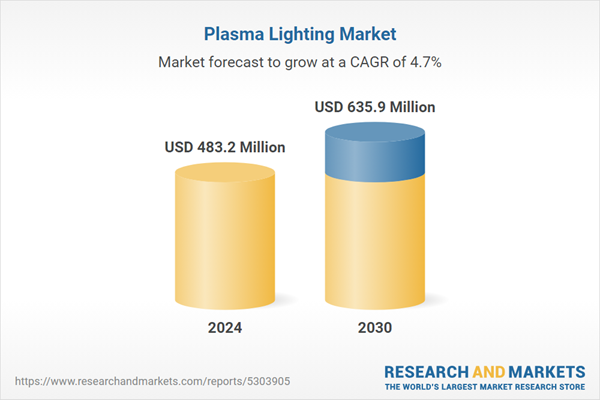Global Plasma Lighting Market - Key Trends & Drivers Summarized
What Is Plasma Lighting and Why Is It Becoming a Prominent Lighting Solution?
Plasma lighting, also known as Light Emitting Plasma (LEP), is a form of lighting technology that generates light through an electrically charged plasma gas. Unlike traditional incandescent or LED lights, plasma lighting operates without electrodes, relying on radio frequency (RF) energy to excite the gas and produce bright, full-spectrum light. Known for its high energy efficiency, long lifespan, and ability to produce intense, natural light, plasma lighting is gaining prominence across various industries, including horticulture, industrial lighting, and outdoor applications such as street lighting and stadium illumination. Plasma lighting is particularly valuable in applications that require powerful and high-intensity light, such as large-scale outdoor venues or indoor growing environments where light quality is critical to plant growth. With growing concerns about energy consumption and sustainability, plasma lighting is emerging as a solution that combines performance, energy savings, and durability, making it an increasingly attractive option in the lighting market.How Are Technological Advancements Shaping the Plasma Lighting Industry?
Technological advancements are playing a crucial role in expanding the capabilities and applications of plasma lighting systems. One of the key innovations driving the market is the development of more compact and efficient plasma lighting units that offer superior light quality while consuming significantly less energy compared to traditional lighting systems. Plasma lights produce a broad spectrum of light, closely resembling natural sunlight, which makes them ideal for horticultural applications, as plants require specific wavelengths for photosynthesis and growth. Unlike traditional lighting technologies, plasma lights emit very little heat, reducing the risk of heat damage to plants or crops in controlled indoor environments. As a result, plasma lighting has gained popularity in commercial greenhouses and indoor farming, where consistent, high-quality lighting is essential for optimizing crop yields.Advances in RF technology have also made plasma lighting systems more energy-efficient, allowing them to produce intense light output with minimal energy consumption. This energy efficiency is particularly important for large-scale outdoor applications, such as sports stadiums, parking lots, and street lighting, where energy costs are a significant concern. Furthermore, plasma lighting systems are known for their durability and long lifespan, often lasting up to 30,000 hours or more without significant degradation in light quality. This longevity, combined with reduced maintenance requirements, is another key factor driving the adoption of plasma lighting, especially in industrial and commercial settings where reliability and operational efficiency are paramount.
Another area of technological innovation is in plasma lighting's ability to provide superior color rendering and brightness consistency compared to other lighting technologies. The broad-spectrum light emitted by plasma lights closely mimics natural daylight, providing better visual acuity and making them suitable for tasks that require precision and clarity, such as high-end retail lighting or industrial inspection applications. These technological advancements are helping to expand the use cases of plasma lighting, positioning it as a versatile and efficient lighting solution for a range of industries.
What Challenges Are Driving the Adoption of Plasma Lighting?
Several challenges across various sectors are fueling the adoption of plasma lighting technology. One of the most significant challenges is the increasing need for energy-efficient lighting solutions in large-scale applications, such as public infrastructure, industrial complexes, and agricultural facilities. As global energy costs rise and governments implement stricter energy efficiency regulations, businesses and municipalities are seeking lighting systems that reduce energy consumption while maintaining high light output. Plasma lighting, with its ability to provide intense, full-spectrum light while consuming less power than traditional lighting systems like high-intensity discharge (HID) lamps, is seen as a solution to this challenge. Its energy efficiency also aligns with sustainability goals, as many organizations aim to reduce their carbon footprints and adopt more eco-friendly technologies.In the horticulture sector, the demand for better-controlled lighting environments in indoor farming and greenhouse operations is driving the adoption of plasma lighting. As the global population grows and the demand for food increases, indoor farming has become a viable solution to ensure year-round crop production. Plasma lighting's ability to deliver a natural light spectrum without excessive heat makes it an ideal option for indoor farms, where consistent light quality is crucial for optimizing plant growth and productivity. Additionally, the shift toward urban farming and vertical farming has created a need for lighting systems that can provide efficient light coverage in confined spaces, further driving the demand for plasma lighting.
Another challenge driving the market is the need for long-lasting, durable lighting systems in industrial and commercial environments. Traditional lighting technologies often require frequent replacements and maintenance, which can be costly and disruptive. Plasma lighting, with its extended lifespan and reduced maintenance needs, offers a cost-effective solution for industries that require reliable, long-term lighting solutions. For example, in large outdoor venues like stadiums or parking lots, where lighting is critical for safety and visibility, plasma lighting provides consistent, high-intensity illumination with minimal maintenance, helping to reduce operational costs.
Lastly, the need for superior color rendering in specific industries, such as manufacturing, retail, and medical applications, is another factor driving the adoption of plasma lighting. High color rendering index (CRI) and brightness consistency are critical for ensuring accurate visual assessments, whether it's for quality control in industrial settings or enhancing product displays in retail environments. Plasma lighting's ability to deliver natural, high-CRI light makes it a preferred choice for these applications, where precision and clarity are essential.
What Factors Are Driving the Growth in the Plasma Lighting Market?
The growth in the plasma lighting market is driven by several key factors that reflect the increasing demand for energy-efficient, durable, and high-performance lighting solutions. One of the most important drivers is the growing focus on sustainability and energy conservation in both the public and private sectors. As global energy demand increases and concerns over carbon emissions rise, there is a strong push toward adopting lighting technologies that offer significant energy savings. Plasma lighting systems, which consume less power while delivering high light intensity, are being recognized as a cost-effective solution for reducing energy usage in large-scale applications such as public infrastructure, industrial facilities, and horticulture. Another key factor driving market growth is the expanding adoption of indoor and vertical farming, particularly in urban areas. As space constraints and changing weather patterns challenge traditional farming methods, indoor agriculture has gained momentum. Plasma lighting, with its ability to deliver consistent, full-spectrum light that mimics natural sunlight, is becoming an essential component of indoor farming systems, helping to boost crop yields and improve plant health in controlled environments. Technological advancements in plasma lighting are also propelling market growth. The continuous improvement in RF and plasma arc technology has made plasma lighting systems more efficient, compact, and versatile, broadening their application across various industries. These innovations are not only enhancing the performance of plasma lighting but also making it more affordable and accessible to a wider range of consumers. Furthermore, the increased focus on reducing operational costs in industrial and commercial settings is driving the adoption of plasma lighting due to its long lifespan and low maintenance requirements. Government regulations and policies promoting energy-efficient lighting are also playing a crucial role in market expansion. Many countries are phasing out inefficient lighting technologies and offering incentives for adopting sustainable alternatives. Plasma lighting, with its energy-efficient profile and environmentally friendly features, aligns with these regulatory trends, encouraging businesses and public institutions to invest in plasma-based lighting solutions. Collectively, these factors are driving robust growth in the plasma lighting market, as industries and governments seek to meet energy efficiency and sustainability goals without compromising on performance.Report Scope
The report analyzes the Plasma Lighting market, presented in terms of market value (US$ Thousand). The analysis covers the key segments and geographic regions outlined below.- Segments: Application (Industrial, Roadways, Streets & Tunnels, Horticulture, Sports & Entertainment, Other Applications).
- Geographic Regions/Countries:World; United States; Canada; Japan; China; Europe (France; Germany; Italy; United Kingdom; and Rest of Europe); Asia-Pacific; Rest of World.
Key Insights:
- Market Growth: Understand the significant growth trajectory of the Industrial Application segment, which is expected to reach US$239.2 Million by 2030 with a CAGR of a 4.4%. The Roadways, Streets & Tunnels Application segment is also set to grow at 5.2% CAGR over the analysis period.
Why You Should Buy This Report:
- Detailed Market Analysis: Access a thorough analysis of the Global Plasma Lighting Market, covering all major geographic regions and market segments.
- Competitive Insights: Get an overview of the competitive landscape, including the market presence of major players across different geographies.
- Future Trends and Drivers: Understand the key trends and drivers shaping the future of the Global Plasma Lighting Market.
- Actionable Insights: Benefit from actionable insights that can help you identify new revenue opportunities and make strategic business decisions.
Key Questions Answered:
- How is the Global Plasma Lighting Market expected to evolve by 2030?
- What are the main drivers and restraints affecting the market?
- Which market segments will grow the most over the forecast period?
- How will market shares for different regions and segments change by 2030?
- Who are the leading players in the market, and what are their prospects?
Report Features:
- Comprehensive Market Data: Independent analysis of annual sales and market forecasts in US$ Million from 2024 to 2030.
- In-Depth Regional Analysis: Detailed insights into key markets, including the U.S., China, Japan, Canada, Europe, Asia-Pacific, Latin America, Middle East, and Africa.
- Company Profiles: Coverage of players such as Ceravision, Green De Crop, Griffin & Ray, Guangzhou Kaiming Industries, Hive Lighting Inc and more.
- Complimentary Updates: Receive free report updates for one year to keep you informed of the latest market developments.
Some of the 36 companies featured in this Plasma Lighting market report include:
- Ceravision
- Green De Crop
- Griffin & Ray
- Guangzhou Kaiming Industries
- Hive Lighting Inc
- Ka Shui International Holdings
- LUMA Group
- Lumartix SA
- Plasma International GmbH
- Solaronix SA
- Topanga Technologies Inc
This edition integrates the latest global trade and economic shifts into comprehensive market analysis. Key updates include:
- Tariff and Trade Impact: Insights into global tariff negotiations across 180+ countries, with analysis of supply chain turbulence, sourcing disruptions, and geographic realignment. Special focus on 2025 as a pivotal year for trade tensions, including updated perspectives on the Trump-era tariffs.
- Adjusted Forecasts and Analytics: Revised global and regional market forecasts through 2030, incorporating tariff effects, economic uncertainty, and structural changes in globalization. Includes historical analysis from 2015 to 2023.
- Strategic Market Dynamics: Evaluation of revised market prospects, regional outlooks, and key economic indicators such as population and urbanization trends.
- Innovation & Technology Trends: Latest developments in product and process innovation, emerging technologies, and key industry drivers shaping the competitive landscape.
- Competitive Intelligence: Updated global market share estimates for 2025, competitive positioning of major players (Strong/Active/Niche/Trivial), and refined focus on leading global brands and core players.
- Expert Insight & Commentary: Strategic analysis from economists, trade experts, and domain specialists to contextualize market shifts and identify emerging opportunities.
Table of Contents
Companies Mentioned (Partial List)
A selection of companies mentioned in this report includes, but is not limited to:
- Ceravision
- Green De Crop
- Griffin & Ray
- Guangzhou Kaiming Industries
- Hive Lighting Inc
- Ka Shui International Holdings
- LUMA Group
- Lumartix SA
- Plasma International GmbH
- Solaronix SA
- Topanga Technologies Inc
Table Information
| Report Attribute | Details |
|---|---|
| No. of Pages | 108 |
| Published | February 2026 |
| Forecast Period | 2024 - 2030 |
| Estimated Market Value ( USD | $ 483.2 Million |
| Forecasted Market Value ( USD | $ 635.9 Million |
| Compound Annual Growth Rate | 4.7% |
| Regions Covered | Global |









